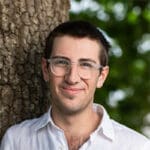Harnessing the power of engineering for good

26 July 2024 at 9:00 am
Across the Middle East, Asia, and the Pacific, Peter McArdle’s experience includes climate and environment policy, public health, emergency operations, and the protection of infrastructure in armed conflict with the Red Cross/Red Crescent Movement, NGOs, and social enterprise. For his work preparing for and responding to global crises, Peter was Awarded the International Service Medal for ‘exemplary service’ by Australian Red Cross. Constantly curious, and intrigued by balancing diverse perspectives and knowledge, complexity, and creative problem solving, Peter holds a Bachelor of Engineering (Civil), a Master of Peace and Conflict Studies, and a PhD in Sociology exploring the social impacts of community conflict and resilience in the face of water scarcity.
Peter is the Chief Engineer at Engineers Without Borders Australia, working alongside communities left behind by the rapid pace of global development, helping them gain access to knowledge, skills and technologies to achieve their priorities. As a charity, Engineers Without Borders Australia relies on public support to deliver urgently needed work alongside climate-vulnerable and developing communities in Cambodia, Vanuatu, Timor-Leste and here in Australia through our First Nations Program. Read on for our interview with Peter!
Describe your career trajectory and how you got to your current position.
While I started out as a civil engineer in public water utilities in NSW, I pivoted to the humanitarian and development sector when I joined Australian Red Cross as a water and sanitation engineer. That has taken me to many crises around the world over 15 years, about half of which was spent in the Middle East, including Iraq, Yemen and Lebanon. I studied Peace and Conflict at the same time, which is an unusual but incredibly interesting combination with engineering.
Take us through a typical day of work for you.
There’s no such thing, and I enjoy that. One day I’ll be doing a site survey on coastal erosion in Vanuatu, the next advocating for better policy on inclusive infrastructure, and the next working on research around the use of AI in humanitarian action. It’s incredibly varied, but all with the common purpose of bringing about positive change for people’s lives through better use of technology.
What is the biggest challenge you’ve encountered in your career, and how did you overcome it?
If there’s one consistent theme throughout my career it’s how to do a lot with little. Whether that’s responding to public health crises in the midst of armed conflict, or securing financial support for safe and dignified water access alongside First Nations communities in Australia, mobilising resources is a constant challenge.
If you could go back in time, what piece of advice would you give yourself as you first embarked on your career?
Sticking to your values and boundaries is important, but it’s not always fast, fun, or easy.
How do you unwind after work?
Tennis, music, and amazing food in western Sydney.







